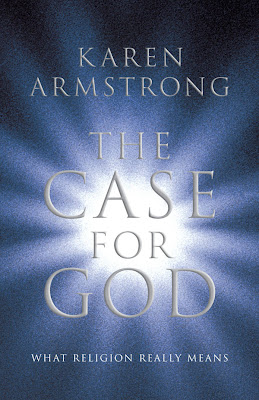About God and Religion

Religion is not as much about God as it is about a projection of God, as seen within a culture. That is why religions evolve in time, and also the understanding of God. Nicholas D. Kristof discusses in today's NY Times three new books on this subject:
Just a few years ago, it seemed curious that an omniscient, omnipotent God wouldn’t smite tormentors like Richard Dawkins, Christopher Hitchens and Sam Harris. They all published best-selling books excoriating religion and practically inviting lightning bolts.
Traditionally, religious wars were fought with swords and sieges; today, they often are fought with books. And in literary circles, these battles have usually been fought at the extremes.
Fundamentalists fired volleys of Left Behind novels, in which Jesus returns to Earth to battle the Anti-Christ (whose day job was secretary general of the United Nations). Meanwhile, devout atheists built mocking Web sites like www.whydoesGodhateamputees.com. That site notes that although believers periodically credit prayer with curing cancer, God never seems to regrow lost limbs. It demands an end to divine discrimination against amputees.
This year is different, with a crop of books that are less combative and more thoughtful. One of these is The Evolution of God, by Robert Wright, who explores how religions have changed — improved — over the millennia. He notes that God, as perceived by humans, has mellowed from the capricious warlord sometimes depicted in the Old Testament who periodically orders genocides.
(In 1 Samuel 15:3, the Lord orders a mass slaughter of the Amalekite tribe: Now go and attack Amalek, and utterly destroy all that they have, and do not spare them. But kill both man and woman, infant and nursing child. These days, that would earn God an indictment before the International Criminal Court.)
Mr. Wright also argues that monotheism emerged only gradually among Israelites, and that the God familiar to us may have resulted from a merger of a creator god, El, and a warrior god, Yahweh. Mr. Wright also argues that monotheism wasn’t firmly established until after the Babylonian exile, and he says that Moses’s point was that other gods shouldn’t be worshiped, not that they didn’t exist. For example, he notes the troubling references to a divine council and gods — plural — in Psalm 82.
In another revelation not usually found in Sunday School classes, Mr. Wright cites Biblical evidence that God (both El and Yahweh) had a sex life, rather like the Greek gods, and notes archaeological discoveries indicating that Yahweh may have had a wife, Asherah.
As for Christianity, Mr. Wright argues that it was Saint Paul — more than Jesus, an apocalyptic prophet — who emphasized love and universalism and built Christian faith as it is known today. Saint Paul focused on these elements, he says, partly as a way to broaden the appeal of the church and convert Gentiles.
Mr. Wright detects an evolution toward an image of God as a more beneficient and universal deity, one whose moral compass favors compassion for humans of whatever race or tribe, one who is now firmly in the antigenocide camp. Mr. Wright’s focus is not on whether God exists, but he does suggest that changing perceptions of God reflect a moral direction to history — and that this in turn perhaps reflects some kind of spiritual force.
To the extent that god grows, that is evidence — maybe not massive evidence, but some evidence — of higher purpose, Mr. Wright says.
Another best-seller this year, Karen Armstrong’s The Case for God, likewise doesn’t posit a Grandpa-in-the-Sky; rather, she sees God in terms of an ineffable presence that can be neither proven nor disproven in any rational sense. To Ms. Armstrong, faith belongs to the realm of life’s mysteries, beyond the world of reason, and people on both sides of the God gap make the mistake of interpreting religious traditions too literally.
Over the centuries people in all cultures discovered that by pushing their reasoning powers to the limit, stretching language to the end of its tether, and living as selflessly and compassionately as possible, they experienced a transcendence that enabled them to affirm their suffering with serenity and courage, Ms. Armstrong writes. Her book suggests that religion is not meant to regrow lost limbs, but that it may help some amputees come to terms with their losses.
Whatever one’s take on God, there’s no doubt that religion remains one of the most powerful forces in the world. Today, millions of people will be giving thanks to Him — or Her or It.
Another new book, The Faith Instinct, by my Times colleague Nicholas Wade, suggests a reason for the durability of faith: humans may be programmed for religious belief, because faith conferred evolutionary advantages in primitive times. That doesn’t go to the question of whether God exists, but it suggests that religion in some form may be with us for eons to come.
I’m hoping that the latest crop of books marks an armistice in the religious wars, a move away from both religious intolerance and irreligious intolerance. That would be a sign that perhaps we, along with God, are evolving toward a higher moral order.
(Nicholas D. Kristof invites you to comment his article on his blog, On the Ground. Thank you)
(Church in America)

0 Comments:
Post a Comment
<< Home